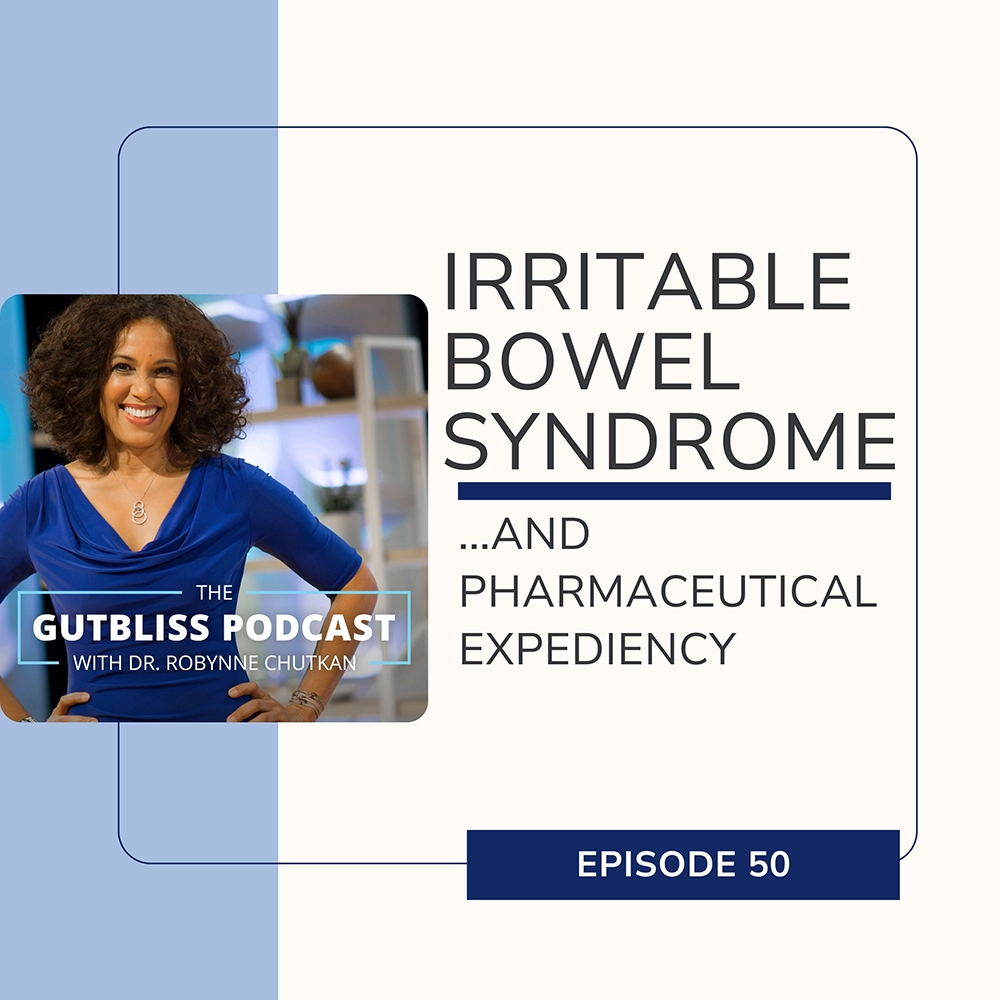For anyone who’s ever questioned the need – or the risk – of taking an antibiotic for a non-life threatening infection like Strep, this episode tells you everything you need to know, and provides you with important questions to ask your doctor before committing to a course of antibiotics.
Thank you for being a part of our community! For the latest in digestive wellness go to https://gutbliss.com/ and follow us on Instagram for more gut health info.
On today’s show, a lovely patient of mine, Lisa, called me in crisis last week about her six year old daughter Freya. Freya had a low grade fever and sore throat for a couple days and a swab at the pediatrician’s office was positive for Strep. They were recommending antibiotics, but Lisa was concerned because Freya had been on multiple courses of antibiotics in the last few years for strep, ear infections, sore throats and colds. She’d been prescribed antibiotics about 3 times every year since she was a toddler, so around 15 courses of antibiotics in the last five years. Lisa was also concerned that the care was starting to seem a little algorithmic. The last couple times the doctor’s office had prescribed antibiotics on the phone without seeing Freya in person, and there hadn’t really been any discussion about whether the antibiotics were truly necessary. To be fair, it was a busy pediatric practice, and they were really good about taking Lisa’s calls, and fitting Freya in for a same day appointment with the physician’s assistant if the doctor wasn’t available. And you can imagine what that’s like, right? You work at a busy pediatrics practice, and you have frantic parents calling you all day long, concerned about their children and wanting an immediate solution to their symptoms. Not an easy job.
Lisa herself had struggled with an infection called Clostridium difficile, which she developed as a result of antibiotic use, so she had real concerns for the amount of antibiotics Freya had taken – especially at such a young age. But the reality was Freya was feeling crummy, she had a positive Strep test, and they needed to make a decision about what to do.
Now, full disclaimer here. I am not a pediatrician. And I am also not your doctor or your child’s doctor, so I am not in a position to give you medical advice. The goal of today’s show is not to tell you whether or not you should treat strep. It’s to give you a framework to help you make these decisions, and also to provide you with some important questions to ask your doctor if you find yourself in a situation like this. And coming up, I’m going to explain what that framework is, and tell you exactly what types of probing questions you should be asking your healthcare practitioner.
So let’s start with a basic question. Is excessive antibiotic use a potential problem in young children? The answer to that is yes. It’s problematic for all of us actually, but particularly for younger people, and here’s why: it’s because their microbiome – that community of trillions of microbes that reside primarily in our digestive tract – is still developing. The microbiome matures into a more complex ecosystem beginning around age 3, but it’s still tender up until around age 18 to 20, meaning that it’s more susceptible to damage than a mature adult microbiome. And antibiotics are one of those factors that can significantly disrupt the microbiome. We haveclear scientific evidence that antibiotics negatively impact the diversity and composition of the microbiome in children and are associated an increased risk of conditions like obesity, asthma, and allergies.
Lots of ultra processed food, and limited exposure to nature during those early years can also have a negative impact. Having older siblings, or a dog in the household can have the opposite effect: they can increase microbial diversity and positively impact the developing microbiome in children. Now don’t worry if your kid is an only child or you don’t have a dog. As long as your child is interacting with other children regularly and getting out in nature, hopefully with some exposure to soil and animals, you can still reap some of those benefits.
Increasingly in the scientific literature as well as in clinical practice, we see an association with frequent antibiotics in early life and the development of autoimmune conditions like Crohn’s disease in young adulthood. A large meta-analysis study in 2014 from Mount Sinai Hospital where I did my GI fellowship, looked at over 7,000 children and confirmed that early antibiotic use was a major risk factor for developing Crohn’s disease. And we’ve seen similar data showing an association between early antibiotics and the development of asthma. There’s also data showing that early antibiotics can affect the neurodevelopment of children. A recent study from 2023 looked at children who received antibiotics in the first 6 months of life, and found that overall they had significantly lower verbal and cognitive ability scores at age 11 on intelligence tests, and increased problems with executive function. Why do antibiotics have such a profound negative impact? Because in addition to digesting food and synthesizing hormones, our gut microbes are also intimately involved in brain development and training the immune system.
So in a child like Freya, we’re balancing the need to treat the Strep with the potential harm to her microbiome. And the tricky thing is that some of these potential complications are theoretical or will develop in the future, years later. But this should be a personalized decision that is based on two factors. Factor #1 is what is the overall health of your child? If your child, like mine, was born via C-section, minimally nursed, and exposed to lots of antibiotics as a newborn – and more on that in a future episode – you might have a much higher threshold for deciding when an antibiotic is appropriate. If your child, on the other hand, has had little or no antibiotics, the decision tree might look a little bit different. Factor #2 is how sick are they? Do they have a raging fever and huge lymph nodes in their neck and can’t even get down fluids without vomiting? Or are they just a little listless with a poor appetite but able to hydrate? Strep is a bacterial infection, but the reality is that it is self-limited in most people, meaning it will eventually resolve on its own without antibiotics. The main reason we treat Strep is to prevent two potentially serious side effects. One is rheumatic heart disease, and the other is a type of kidney disease called post-strep glomerulonephritis. Fortunately, these two conditions are pretty rare and because of the widespread availability of antibiotics we see a lot less of them. But that same widespread availability has also led to overtreatment, and in addition to the potential long term complications that I talked about earlier like autoimmune disease and cognitive problems, we also have to worry about antibiotic associated diarrhea and Clostridium Difficile, and global antibiotic resistance. So these are the sorts of questions we are grappling with – both individually and as a medical community.
My basic rule of thumb is if you or your child are feeling sick, you should be evaluated by a health care practitioner. Period. End of story. But that does not necessarily mean that that encounter has to end with a prescription for antibiotics. It shouldn’t just be a knee jerk reaction that symptoms. Including even a fever, automatically equal antibiotics. Eyeballing the patient is really important. Anyone who has been practicing medicine for even a few years knows the difference between a sick child and a really sick child. And that difference is more than just what the thermometer says or whether the culture comes back positive or not. It requires taking a good look, doing a physical exam, and engaging with the child about how they’re feeling. And we do the same thing in adults too.
And again, we have to do that calculation between how many antibiotics have been administered in the past, and how sick the person is right now. There are some infections that definitely require antibiotic treatment, but more often the need for antibiotics is a gray area. A study published in the journal Pediatrics found that pediatricians prescribed antibiotics 62% of the time when they perceived that parents expected them to be prescribed, and only 7% of the time when they thought parents didn’t, suggesting that the need for antibiotics is frequently optional.
It’s not just children who are being overtreated. Two out of every three adults who see a health practitioner for cold or flu symptoms are prescribed antibiotics, which 80% of the time don’t meet Centers for Disease Control and Prevention (CDC) guidelines for antibiotic therapy.
So having a conversation with your healthcare practitioner to talk about all of these issues is essential. In my second book, The Microbiome Solution, I have a section called “Ten Questions to Ask Your Doctor if You’ve Been Prescribed an Antibiotic”. And I also have a section called “Ten Things to Do After You’ve Been Prescribed an Antibiotic” to try and get your microbiome back to a healthy baseline. But I always recommend trying to avoid the antibiotic as the most important thing to do. The two questions I always recommend asking are #1: is this antibiotic absolutely necessary? And #2: what would happen if I didn’t take it? Question #2 is really asking what is the natural history of this illness in the absence of antibiotic treatment. You would be surprised how often the answer to the 1st question is no, it’s not necessary. And the answer to the 2nd question is you may be sick for a day or two longer, but this is going to resolve without treatment.
And it’s important to keep an open mind both ways. You don’t want to walk in there with this fixed mentality of absolutely no antibiotics, no matter what. But you also want to let the doctor or nurse know that you are open to the idea of watchful waiting and avoiding an antibiotic if at all possible. I have an obvious bias because many of the patients I see received excessive antibiotics as children or young adults and are now dealing with autoimmune diseases like Crohn’s, ulcerative colitis, or some other manifestation of a disrupted microbiome. We can’t draw a straight line from antibiotic use to autoimmune disease, but we know that environmental triggers like excessive antibiotics in early childhood or an ultra-processed diet are factors that can result in expression of an autoimmune disease, particularly in somebody who is genetically susceptible.
If you’re in one of these grey zone situations, what I often recommend is going ahead and getting the prescription for the antibiotic. And actually getting that prescription filled so you have it at the ready. And then get clear instructions from your doctor about what sorts of red flags to look for that might require you to go ahead and start those antibiotics. So that way you’re prepared and ready if things go south. And part of that equation might involve a follow up at the doctor’s office in 24 or 48 hours so they can re-examine you and make sure that things are moving in the right direction.
Whether it’s your child who’s sick or you have a sinus infection, or a bad cold and you’re worried about your symptoms and whether you may need an antibiotic, I want to remind you that while antibiotics can be lifesaving, there is no doubt that they are currently overused and over prescribed. And in addition to global concerns about antibiotic resistance, there is the individual concern about the hit your microbiome is going to take. And this is particularly true in young people. The idea that you can just undo that damage with a probiotic is magical thinking.
This is a topic I care deeply about, and it’s one that I have a personal interest in because as I mentioned earlier, my own beloved daughter was very sick as an infant and young child as a result of excessive antibiotics prescribed by her lovely and well-meaning pediatrician. It was an experience that profoundly impacted me as a mother and as a physician and really led me to change my practice from doing lots of colonoscopy and prescribing lots of drugs, to looking more carefully at the gut microbiome and how we can maintain and improve health by taking care of our gut bacteria. That being said, this decision should always be personalized for you or your child. Please do not make a decision about antibiotics – or any other intervention – based on what you’re hearing on this podcast. That’s not the goal. I’m not giving you medical advice; I am giving you information and tools so that you can have a more informed discussion with your healthcare provider. And it’s my pleasure and honor to do that!
So I want to leave you with three takeaways about this issue of to treat or not to treat with an antibiotic.
1. Make sure you convey to your practitioner that you are not looking for a quick fix and you are willing to wait and watch for worrisome symptoms if that is a reasonable option.
2. Many infections, even bacterial infections, are self-limited and will resolve on their own without antibiotics. You may be sick for a day or two longer and the symptoms may be a little more severe, but for many coughs, colds and sore throats, complete resolution in the absence of antibiotics is not only possible, but likely.
3. Understand that there is no antibiotic out there which is only going to kill the pathogen and not harm your essential gut bacteria, so you need to carefully weigh the risks and benefits of the antibiotic before proceeding.
So that’s it for this edition of the Gutbliss podcast on To Treat or Not to Treat: decision making around antibiotics.









